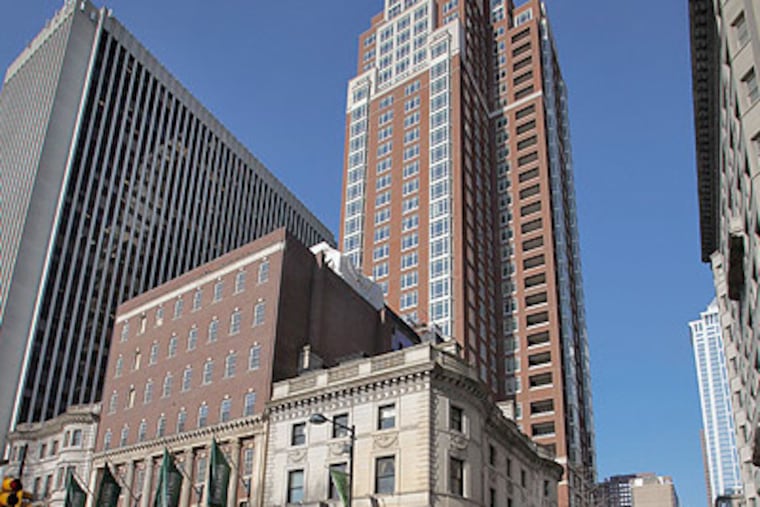Judge names Dranoff receiver for 10 Rittenhouse Square
A Common Pleas Court judge Tuesday appointed developer Carl Dranoff receiver for 10 Rittenhouse Square, the multimillion-dollar high-rise condo building at 130 S. 18th St. in the first of two steps sought last year by the project's senior lender but delayed by an abortive Chapter 11 bankruptcy filing.

A Common Pleas Court judge Tuesday appointed developer Carl Dranoff receiver for 10 Rittenhouse Square, the multimillion-dollar high-rise condo building at 130 S. 18th St. in the first of two steps sought last year by the project's senior lender but delayed by an abortive Chapter 11 bankruptcy filing.
The lender, Istar Financial of New York, had sued Sept. 10 to foreclose on the 33-story, 143-unit building and asked for appointment of a receiver, who works for the court, to maintain 10 Rittenhouse's residential and commercial spaces, complete and sell its many unfinished units - ranging in price from $600,000 to $15 million - and operate its condo association.
On Dec. 30, Judge Albert W. Sheppard Jr. was just seven minutes away from appointing Dranoff when the Delaware Valley Real Estate Investment Fund - the mezzanine lender that had taken control from developer ARC Wheeler in July - sought Chapter 11 protection in U.S. Bankruptcy Court for the building, known in the filing as Philadelphia Rittenhouse Developer L.P.
Philadelphia Rittenhouse remains the legal owner, but as receiver Dranoff is now in charge of operations, said Cynthia Tucker, senior vice president of Istar Financial.
"The foreclosure process, which was delayed by the bankruptcy filing, will resume from the point where it stopped," Tucker said in an interview Tuesday.
In the meantime, she said, "we are still the lender and have certain rights under the loan documents." Istar will advance money to the receiver to pay bills and will act on Dranoff's recommendations, she added.
Last week, after the bankruptcy case was dismissed, Istar paid the city about $700,000 in back real estate taxes, Tucker said.
After months of lackluster sales at 10 Rittenhouse, the Delaware Valley Real Estate Investment Fund sued Istar and took control of the property in July.
In a statement Tuesday, John M. Decker of Dequity Investment Group L.L.C., which managed the building for Philadelphia Rittenhouse Developers and the investment fund, said: "We are cooperating fully with Istar's recommendation [for receiver]. We believe an argument over who should be appointed is not in the best interest of the project and the homeowners at this time."
Ten Rittenhouse is the second Center City condo building for which Istar Financial has succeeded in securing a court-appointed receiver. It also was the senior lender for Aria, at 1419 Locust St.
When Aria's New York-based developer defaulted on its loan, the building went into receivership, and sales were halted for a year, starting in January 2009. GoldOller Aria Associates of Philadelphia bought ground-floor commercial space and 55 unsold units at sheriff's sale in November 2009 and has sold all but 10 thus far.
Two weeks ago, Chief Bankruptcy Judge Stephen Raslavich dismissed the 10 Rittenhouse case because the Chapter 11 filing was being used as a tactic by the Delaware Valley Real Estate Investment Fund in its battle with Istar Financial over the building.
The case "was commenced solely to avoid the impending order of the state court," Raslavich said. "Indeed, the debtor had obviously mapped out this strategy in advance but had held back until the final moments, in the event that its opposition to the receivership proceeding might be successful."
The investment fund's lawyer, Albert A. Ciardi III, filed an appeal of Raslavich's dismissal Thursday.
Tuesday's 15-page consent decree resulting in Dranoff's appointment as receiver was reached after nearly four hours of negotiations by lawyers for both parties in Judge Sheppard's City Hall chambers.
As receiver, said Dranoff - president of Dranoff Properties of Philadelphia and developer of Symphony House, 777 South Broad Street, and other city properties - he is 10 Rittenhouse's "de facto developer."
"We will keep a strong hand on the tiller and be focused on maintaining high quality and long-term value of the asset," he said in an interview Tuesday. "We want to reassure current owners that Istar will be stepping up to the plate, funding the requirements, making sure present owners and operations are protected."
In the 1990s, Dranoff acted as court-appointed receiver for Presidential Apartments on City Avenue.
Bankruptcy Court documents show Istar is owed about $205 million in loans to 10 Rittenhouse. The Delaware Valley Real Estate Investment Fund, which manages the pensions of 47,200 workers in the region, mostly in the building trades, has a claim of $62 million.
In his 60-page dismissal of the investment fund's Chapter 11 filing, Raslavich also questioned the validity of four loans, totaling $17.2 million, that Philadelphia Rittenhouse said were made to it by Robert Ambrosi, who originally co-developed the property with the late Hal Wheeler as ARC Wheeler.
Istar challenged the claim, contending that the sum, "if anything," represented capital contributions by the original equity owners (Ambrosi) and not loans.
Philadelphia Rittenhouse said the loans represented substantial unsecured debt that could be protected only if it were allowed to prosecute its reorganization plan under Chapter 11.
Raslavich had evidence of only $5.7 million in unsecured debt, of which almost $5 million was owed to three creditors who said they would vote against any reorganization plan.
There was a "plethora" of indications, Raslavich said, "that the alleged loans are a post-hoc invention of the claimants or the debtor, or the two acting in concert."
"Leaving aside the rather ominous implications of fraud," he said, "there is no basis whatever to conclude that the claims in question relate to legitimate loans."